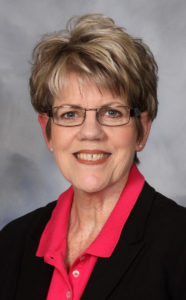By: Ryan Cornelius, Co-Mo Electric Cooperative
 Mary Jane Clark has been a cooperative communicator for 30 years. Soon, she will be retiring from Cuivre River Electric Cooperative in Troy, Missouri. She’s an accomplished Certified Cooperative Communicator and generously took the time to answer questions about her career.
Mary Jane Clark has been a cooperative communicator for 30 years. Soon, she will be retiring from Cuivre River Electric Cooperative in Troy, Missouri. She’s an accomplished Certified Cooperative Communicator and generously took the time to answer questions about her career.
Where did you work before Cuivre? When did you start at Cuivre? Have you always been manager of communications or did you work your way into the job?
Before coming to Cuivre River I worked at a small newspaper and in public information for a rapidly growing city. When my husband, John, and I started a family, I traded traditional employment for flexibility. I helped him start a new business, did substitute teaching, sold real estate, and became very active in the school and community. It turns out good communication skills were an asset in every role. Each opportunity made me a better communicator and prepared me for what quickly became my dream job at Cuivre River. I was hired into the member services department in 1988 as the communications coordinator. I also had member services duties that really helped me learn what means the most to cooperatives – our members and how we serve them. In 2003, our former CEO Dan Brown asked me to lead a new communications department. I was thrilled at the opportunity.
If you could go back to the day you started, what was your first impression of a cooperative?
I was surprised to learn the cooperative was such an integral part of the region I had lived in all of my life. Though I grew up in a very small rural town served by an IOU, the co-op’s influence was all around me. There was so much more to the cooperative than I expected.
What’s one early crisis that sticks out in your mind? How did you handle it? How has the way we communicate with members changed since that time?
An early crisis I recall was “The Flood of 1993.” Public safety and the commitment of our line crews were the focus of our communications. We developed public service messages in conjunction with local authorities and started airing them on cable TV. There were very few methods to spread the word to the general public: news releases mailed to print and radio outlets, and PSAs on our cable TV stations. Methods are so different now and communication is instantaneous, for better or for worse. It’s hard to imagine getting a message out or maintaining a public presence without any website resources, including the internet as a whole, social media, email releases, online outage maps, and a host of smart technologies. These tools thrust us into a 24/7/365 “Always On” environment. I can scarcely remember pre-internet strategies myself, and wouldn’t be caught without my smartphone in a crisis or anywhere else.
What are some things that haven’t changed? With technology advancing, there’s always new ways of getting the word out, but have you noticed anything that hasn’t changed?
Our tools have changed, and with them the urgency to communicate instantly, effectively, accurately and proactively. But not always wisely - mistakes last forever. Even silence or delay is more damaging than we can comprehend. However, the content of our core messages remains familiar – public safety, the commitment of our employees, cooperative principles and values.
What’s the best piece of advice you ever received from a fellow cooperative communicator?
In our amazing cooperative network, there are always people willing to help you learn what you need to know and to become the best communicator you can be. From NRECA to your neighboring co-op, resources abound.
If you had to think of one thing to tell someone who just achieved their CCC, what would it be? Something for them to live by, maybe one cardinal rule?
Never forget who you work for - who pays the bills and makes it possible for you to have this awesome job. We work for our members. They deserve our very best. To make sure we’re giving our best, ask them what they think. I’m a huge supporter of member satisfaction surveys. Get feedback. We may think we do good work, but it’s not enough for it to look good, or even for our peers to like it. It has to work for our members or we’re wasting their money.
What would you tell prospective CCCs about the program? Why is it important?
I learned about the CCC program within my first week at Cuivre River. It soon became clear that earning the CCC is what the best communicators did then, and it’s what the best communicators do now. You are immediately in a community of people who value and understand the importance of what you do for your cooperative even more than your fellow employees do. They can help you succeed, and you can help them. Opportunities to help each other are the icing on the cake.
What will you be doing in retirement? What’s the first thing you want to do, on the first day you don’t have to go to work?
It’s difficult to imagine just what it will be like not to be tethered to the co-op 24/7/365. It will be an adjustment that begins with family, friends and morning coffee.
